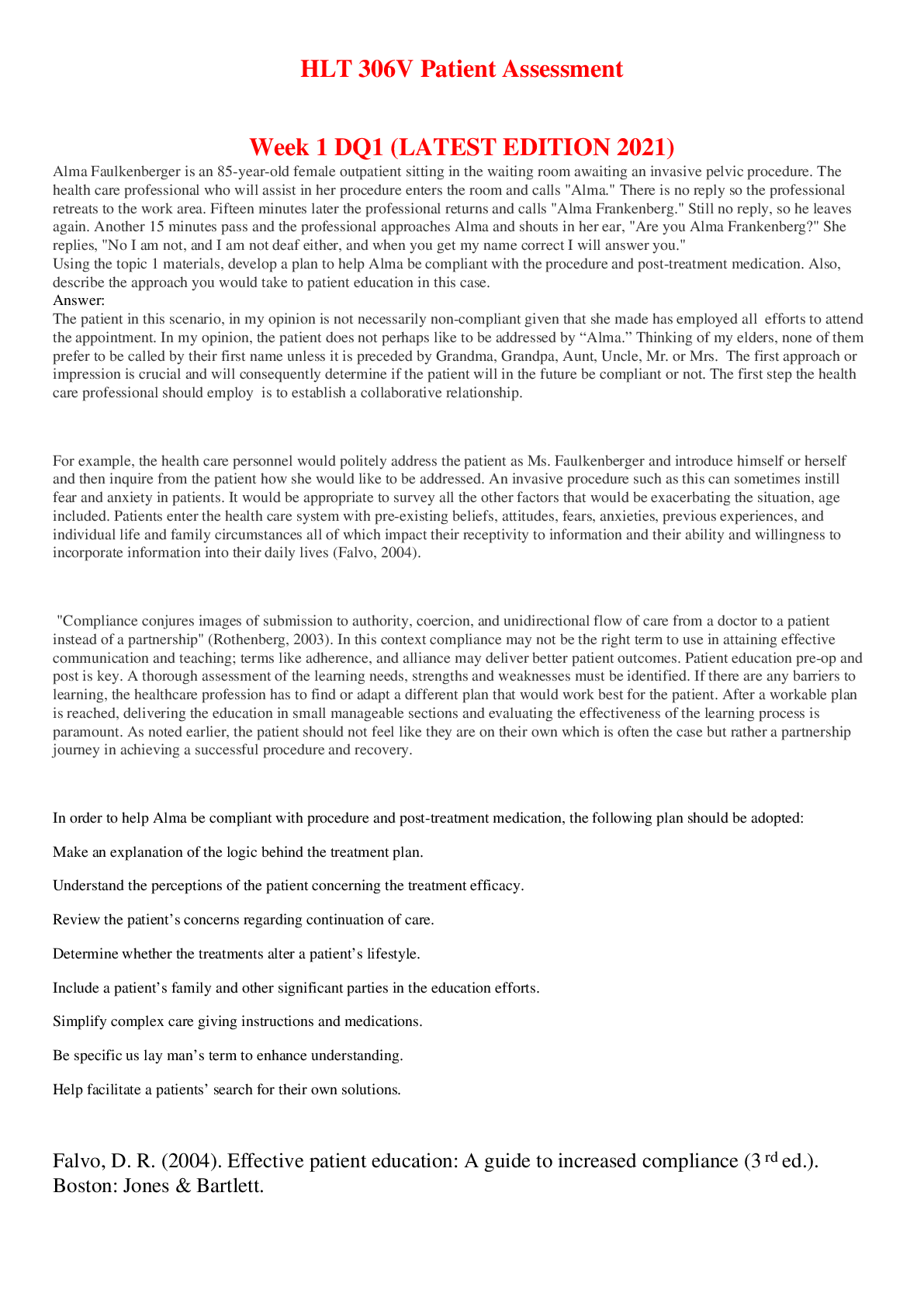Project Management > DISCUSSION POST > PROJ 410 Week 1 DQ 1 Procurement in Projects - Download To Score An A (All)
PROJ 410 Week 1 DQ 1 Procurement in Projects - Download To Score An A
Document Content and Description Below
There are many reasons to pursue business process outsourcing and project procurement, including flexibility, improving methodologies, and increasing productivity. Taking into consideration budget, sc... ope, schedule, and risk, what are some of the other reasons to contract part or all of a project or business process? What are some of the drawbacks to outsourcing? Again, consider this question from the budget, scope, schedule, and risk standpoint. Please remember to answer all components of the question. Apart from considerations e.g. budget, scope, schedule, and risk, there are other reasons why would companies like to contract part or all of a project or business process and these are: - Overhead costs are dramatically cut since the company no longer has to internally maintain the contracted services. - A high level of expertise and technology can be brought into the project. A company no longer has to keep up with technological advances. Instead, it can focus on developing its core competencies and hire firms with the know-how to work on relevant segments of the project. - It provides flexibility to the organization. Organizations are no longer constrained by their own resources but can pursue a segments of the project. Small companies can instantly go global by working with foreign partners. But, there are few disadvantages also of outsourcing project: - Coordination of professionals from different organizations can be challenging, especially if the project work requires close collaboration and mutual adjustment. - There is potential loss of control over the project. The core team depends on other organizations that they have no direct authority over. - Projects are more prone to interpersonal conflict since the different participants do not share the same values, priorities, and culture. - Employee morale is likely to suffer when project work that has normally been done in-house is being transferred to other companies. The company is able to hire labor cheaper and not have to worry about overtime overhead, medical insurance for any additional employees needed, etc. A contracted entity usually specializes in the area contracted for and is set up to provide the services. This saves the Project Manager from creating an in-house unit to provide a service he or she may need only once. Some of the other reasons to contract part or all of a project or business process are to • Maintain all aspects of the project • Legal • To ensure that fulfillment of all contractual obligations are being met. • Some of the drawbacks to outsourcing are • Loss Of Managerial Control • Hidden Costs • Quality Problems There are many reasons to outsource a particular process. Many of those reasons revolve around bottom line profit. Other business reasons that can be the need to build efficiency into the company, By using outsourcing it can free up resources to concentrate on other areas of the business. It is also a way to share risk in certain processes that cannot be easily predicted by making the vendor responsible for these processes. It may also be necessary to outsource when a particular expertise is not available within the customers current structure. As an example a new type of software may need to be developed to address a particular area of the business. It would be more efficient and less risky to employ a vendor who already has the knowledge to complete the project to try and develop that talent in house. On the disadvantage side outsourcing can cause employee issues in the way of trust or involuntary attrition if employee's become disgruntled and leave the company believing they may become a casualty of the work being outsourced. The customer may also lose flexibility and control of the process and bringing that process back in house if needed can difficult. What is Business Process Outsourcing? BPO is hiring another company to take care of the business end for you - such as the finances, payroll, hiring, HR, etc. BPO is the practice of contracting with an outside firm to handle what are normally in-house operations. IT is a common one and Human resources is a growing field. many companies use Temp agencies to handle the initial hiring of employees and vetting them. Business process outsourcing (BPO) is the contracting of a specific business task, such as payroll, to a third- party service provider. Usually, BPO is implemented as a cost-saving measure for tasks that a company requires but does not depend upon to maintain their position in the marketplace. BPO is often divided into two categories: back office outsourcing which includes internal business functions such as billing or purchasing, and front office outsourcing which includes customer-related services such as marketing or tech support. www.techtarget.com BPO is the process of hiring an outside firm or contractor to perform a certain business task. There are many areas of business that this applies to such as payroll or accounting. The business must first determine which process they need to outsource and how it will affect their business. Efficiency and cost are two of the things that must be considered. You must also consider how it will effect your current employees and that it is the long term solution for the business. Business process outsourcing (BPO) is a form of outsourcing that involves the contracting of the operations and responsibilities. This process inculdes specific business functions to a third-party service provider. different ideas of this would be application management and application development, data center operations, or testing and quality assurance. What are the common areas that business process would outsource to other companies or organizations? There are various advantageous to outsourcing different aspects of overall business operation, many of which allows companies to enhance productivity and drive down costs. The concept backing outsourcing is saving, basically companies can obtain sufficient service and a cheaper rate than it would cost to complete the same function in house. The common areas that business process would be outsourced are: .Administration .Asset and Property Management .Finance/Accounting .Human Resources .Procurement/Logistics Companies outsource such business processes as human resources, finance and accounting, customer services, learning services and training, and information technology. CNA is the fourth largest insurance company in the United States, providing such services as risk management, information services, underwriting, and claims administration. Rather than develop training programs for their employees, CNA outsourced this business process to another company. Similarly, many universities outsource a number of operations they used to perform themselves—for example, landscaping, food services, or janitorial services—so that they can focus on core functions more directly related to educating students. According to the text, the common areas that business process would outsource to other companies would be: • -Finance and accounting • -Investment and asset management • -HR • -Procurement • -Logistics • -Real estate management From our text I learned that some of the common areas of BPO are: Finance and accounting Investment and asset management Human resources Procurement Logistics Real estate management And of course depending on your company's setup will determine what fall under what heading or heading may be different. I also learned that companies are starting to review others areas to outsource that are consider to be noncore areas of management. Retrieved from: http://devry.vitalsource.com/#/books/9781118108734/pages/49583127 What are the common reasons for outsourcing business processes? One of the most common reasons for outsourcing business processes is cost. The processes that are outsourced typically don’t fall under the scope of services that the outsourcing company provides. Thus, they outsource them to a company that has more expertise and experience handling these processes. And by having this BPO company handle these processes more effectively and efficiently than you would in-house, the company is able to save money. Another common reason might be improved efficiency. As I stated above, the BPO company typically is experienced with the processes such as human resources or finances in which they have been contracted to handle. Since these functions are core competencies of their organization, they tend to put resources into ensuring they have the latest technology, required training, and staffing necessary to be very efficient at these processes. Thus, these functions are performed in a very efficient manner by the outsourced BPO company whereas that might not be the case if they were done in-house. The common reasons for outsourcing business processes are: • .Transferring a business function to a third party • .Improving methodologies • .To benefit from industry knowledge/experience • .Standardization of processes • .To share resources/technology • .Minimize initial investment • .Flexibility • .Increased productivity • .To quantify benefits or savings more easily • .To track customer satisfaction • .Enhance shareholder value What are the benefits of outsourcing processes? A few of the benefits of outsourcing are: • Cost Savings • Greater ability for companies to concentrate on core business while non-core businesses are outsourced • Implementation of bigger initiatives • Selling assets to remove those assets off books and capital infusion Skilled expertise • Increase productivity the benefits of outsourcing business processes are: • .Cost savings • .Greater ability to concentrate on core business • .Implementation of wide initiatives • .Sale of assets • .Greater utilization of resources • .More/varied skills and resources • .Better access to new methodologies/technologies • .Training expense reduction • .Greater flexibility What are key components in the project procurement management process? The key components in the project procurement management process includes: • .Select sellers/buyers • .Plan contracting • .Plan purchases and acquisitions do you feel that the adequate selection of a contract structure, based on the circumstances in place at the time, can help you limit your risk? Selecting the type of contract structure is a very important factor. If you chose the wrong contract, especially in a project that is most likely have many changes before it is all said and done, you could definitely open your project up to many risks that can lead to failure or incompletion of a project. Agreed, the contract structure is very important. You must be able to cover all aspects of potential risk. Most of the time contract structure is, in the beginning, the cause of most issues. Though, throughout time, the structure will be updated over and over and eventually a structure that works well for your company will emerge. Organizations want everything for less! Is this because they have to make a profit? We've talked about qualifications, fees, price, quality, etc. What about profit? What role does it play? Is it always good for the company to pay least price for contract job or product procurement? At one end of the contract pricing is the cost-plus, a fixed-fee type of contract where the company's profit is fixed and the company's responsibility is minimal. At the other end, we have the lump sum or turnkey contract under which the company assumes full responsibility. In my opinion, it is not always good for payng least price or choosing the least priced vendor. Organization should be more concerned about getting the quality vendor even if it has to negotiate a higher price during the vendor selection. Price of non-conformance or bad quality usually runs into millions especially for the mid to large sized companies in addition to the precious time lost. If the company has some strategic project or product in pipeline which gets delayed due to project non- performance due to incompetent vendor selection/performance, it would mean huge loss for the company. I don't think least price is always the best thing. The price is part of the whole package. The cheapest priced contract may wind up costing more in the long run if the delivered product or services are sub-standard or inadequate. It may be better for the Total cost of the project if a contract that is higher priced is used initially since the quality may also be higher It has been my experience that the lowest bidder in contracts typically can’t handle the work associated with it, these failure could be experienced for many reasons. I witnessed this numerous times while working for as a federal contractor, there were several occasions where contract companies bid far too law to afford the proper manning/specifics. Typically those contracts they are fixed priced or based upon realistic bids are the best option, going with the cheapest possible price could greatly affect the success of a contract. As a private entity, do you feel government regulations are good in promoting fairness and the selection of the best vendor, or are they an overkill (or simply inadequate)? I do feel that government regulations can be good in promoting fairness especially when working with companies overseas. However, there are times when the can do more harm than good. For example, if they require you to go through a long process before being approved, this would interfere with scheduling for your company. I feel that government regulation is a good thing. The problem is that with every set of rules, it is also good business to push your efforts to the breaking point of the regulations in order to turn the most profit. That is the mindset of every business owner and needs to be remembered when dealing with those regulations. Because government regulations are required rules that must be complied with, private entity in some instances are at a disadvantage when it comes to fairness. In order to abide by all the regulations private businesses must have the revenue to be in compliance, which is cost. Yes, there are some regulations that do help small or private businesses but I will say most of the regulations are truly overkill. The fairness in selecting vendors is mainly in the interest of the vendors who must be given equal opportunity as the others even though their credentials are not as good. What is Make-or-Buy Analysis? Can you give an example of Make-or-Buy Analysis? Make-or-buy Analysis is when a company will analyze whether or not they should use there own resources or buy the resources from the vendor. For example, if a company where making jeans they could decided if they were going to process the cotton themselves or have the vendor process the cotton. Here is a link that I found that explains the Make-or-Buy Analysis: http://www.youtube.com/watch? v=gJk2IDOrb80 The project management technique of deciding whether certain work should be performed in-house or whether it should be purchased is called Make-or-Buy Analysis. Make-or-Buy Analysis is listed as a technique for the fourth edition PMBOK®’s Plan Procurements process. A project manager may have a Procurement Management Plan for the project that offers guidance in making these decisions. There are many considerations to take into account when deciding whether or not to purchase, and these considerations will vary across organizations and projects, and over time. Seller’s price will typically be a key consideration. Whether there is currently the level of in-house expertise for the work that needs to be done and the time project team members have available are also important to consider. An example Make-or-Buy Analysis question is: should you mow your own lawn or hire a lawn service company to do it? You may consider whether you currently own a mower, how much time you have to devote to lawn mowing, if allergies or other health issues would make mowing difficult for you, and how much you’re willing to pay a lawn service. The decisions on whether to make or buy something are called Make-or-Buy Decisions. These Make-or-Buy Decisions are an output to the PMBOK®’s Plan Procurements process and then used as an input to the Conduct Procurements process. What are the advantages of making products in house and outsourcing product manufacturing to another company? Outsourcing Information: Advantages: • Cost savings/benefits • Greater ability to concentrate on core business • Implementation of wide initiatives • Sale of assets (moving assets off books, capital infusion) • Greater resources to move to new environment/systems in a faster time frame • More/varied skills and resources • Better access to new methodologies/technology • Training expense reduction • Greater flexibility Halvey, John K.. Business Process Outsourcing: Process, Strategies and Contracts, 2nd Edition. John Wiley & Sons (P&T). In-House Advantages: Control of quality and reputation Containing of intellectual property What is plan procurement process? Procurement Planning is the process used by companies or institutions to plan purchasing activity for a specific period of time. This is commonly completed during the budgeting process. Each year, departments are required to request budget for staff, expenses, and purchases. This is the first step in the procurement planning process. Some of the other reasons to contract part or all of a project or business process are; Committing less up-front investment to new methodologies or technologies, Sharing resources or technologies, Quantifying savings or benefits, Transferring the entire function (not just the IT component) to a qualified supplier, Enhancing shareholder value, Obtaining flexibility with respect to the roll-out of methodologies or technologies, Streamlining or standardizing processes across the organization, Benefiting from industry knowledge or experience. Business Process Outsource: Process, Strategies, and contracts: pg9. Some of the drawbacks to outsourcing are: failure to hire an experienced and reliable service provider can lead to significant down time, unproductive employees, dissatisfied customers and finally the loss of business.“And Outsource the Buildings Too,” Global Services (April 2006): 42. Plan Procurements is one of the 42 project management processes described in the fourth edition PMBOK®. It’s one of the four Procurement knowledge area processes, and one of the twenty Planning processes. The purpose of this process is to document the purchasing decisions and approach as well as identify potential sellers. There is much information needed beforehand to accomplish this, which is represented by eleven inputs to this process. The Scope Baseline and Requirements Documentation are important inputs used to describe the project work to be performed. The specific work that is to be performed in a contract is called the Procurement Statements of Work. It must first be decided whether certain work is best done in-house or whether it should be purchased. This is called Make-or-Buy Analysis, and its outcome is Make-or-Buy Decisions. There are advantages and disadvantages of the different types of contracts that need to be considered as well. The types of contracts that should be used, in addition to much other information, is written in the Procurement Management Plan that provides guidance for performing the procurement processes. Procurement Documents describing what work is needed are made available to sellers in order to elicit their offers. Source Selection Criteria are the criteria developed in this process that will be used to choose among sellers’ responses. For example, sellers representing larger or local organizations might be preferred. Project Procurement Management (PPM) is part of the project management process in which products or services are acquired or purchased from outside the existing employee base (which would work on the project) in order to complete the task or project. There are essentially two different types of procurements, one in which the company is responsible for the particular product or service under a legal contract, this PPM includes contract management responsibilities that issue specific tasks to various team members. Both of these project management processes are imperative to a company’s success. Project Procurement Management can also include responsibility of the contracts in which the buyer that is hired for this particular project is performing the task for a certain seller, this contract is placed between the one providing a service and the particular team that was responsible for completion of this project. PPM includes a variety of tasks including the planning process where one decides what to acquire or purchase and how they will do so. Next, they plan the contract which provides a legal document of the exchange. After the legal documents are drafted, the seller can respond with variety inquiries such as a bid or proposal. After these answers are fed back to them, they will review the various offers and choose whom will be awarded the project. The most important process of Project Procurement Management includes project management relations between both the buyer and seller via the contract. The closure of the contractor sets the project in motion. [Show More]
Last updated: 2 years ago
Preview 1 out of 11 pages
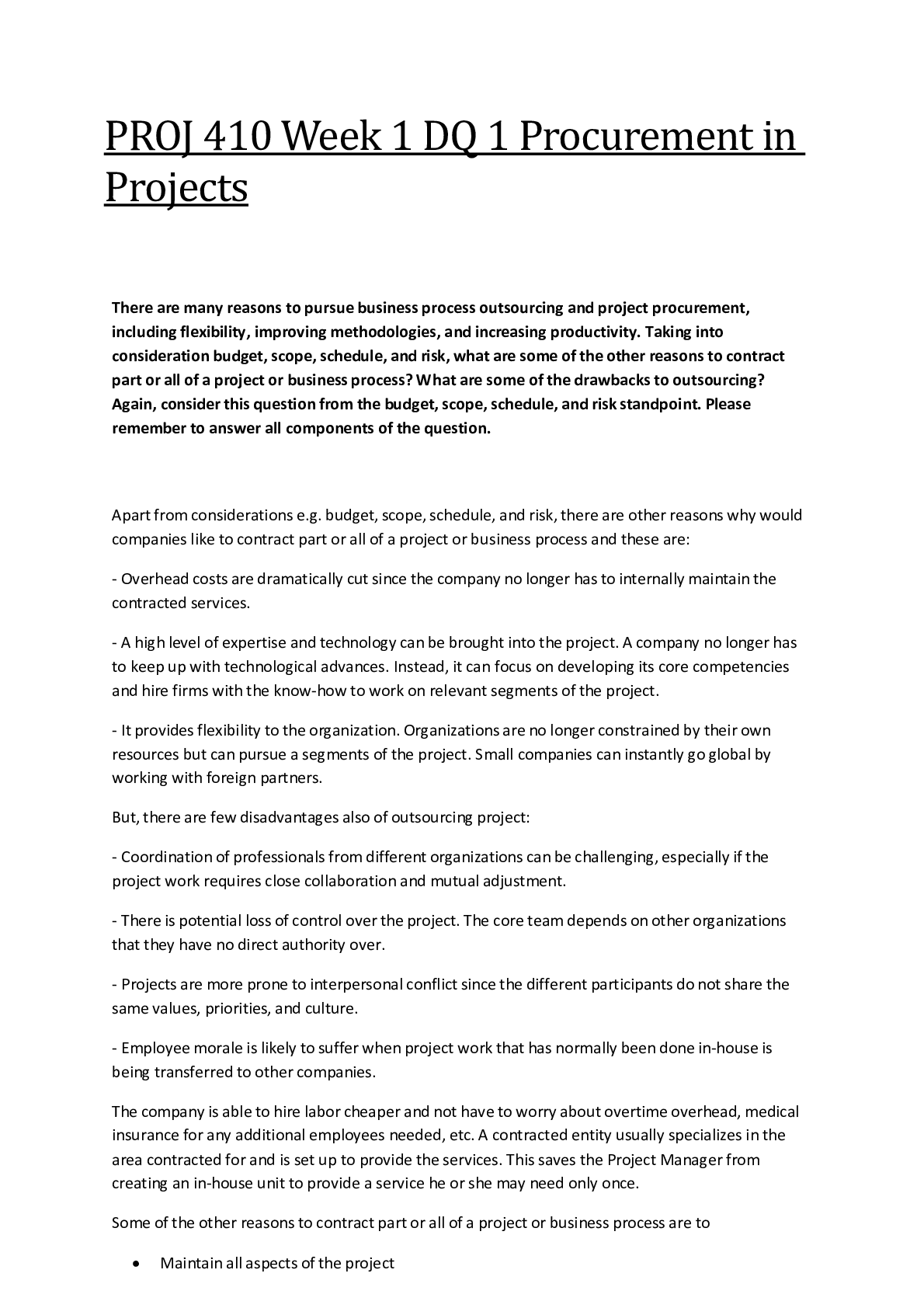
Buy this document to get the full access instantly
Instant Download Access after purchase
Buy NowInstant download
We Accept:

Reviews( 0 )
$12.00
Can't find what you want? Try our AI powered Search
Document information
Connected school, study & course
About the document
Uploaded On
May 25, 2023
Number of pages
11
Written in
Additional information
This document has been written for:
Uploaded
May 25, 2023
Downloads
0
Views
71


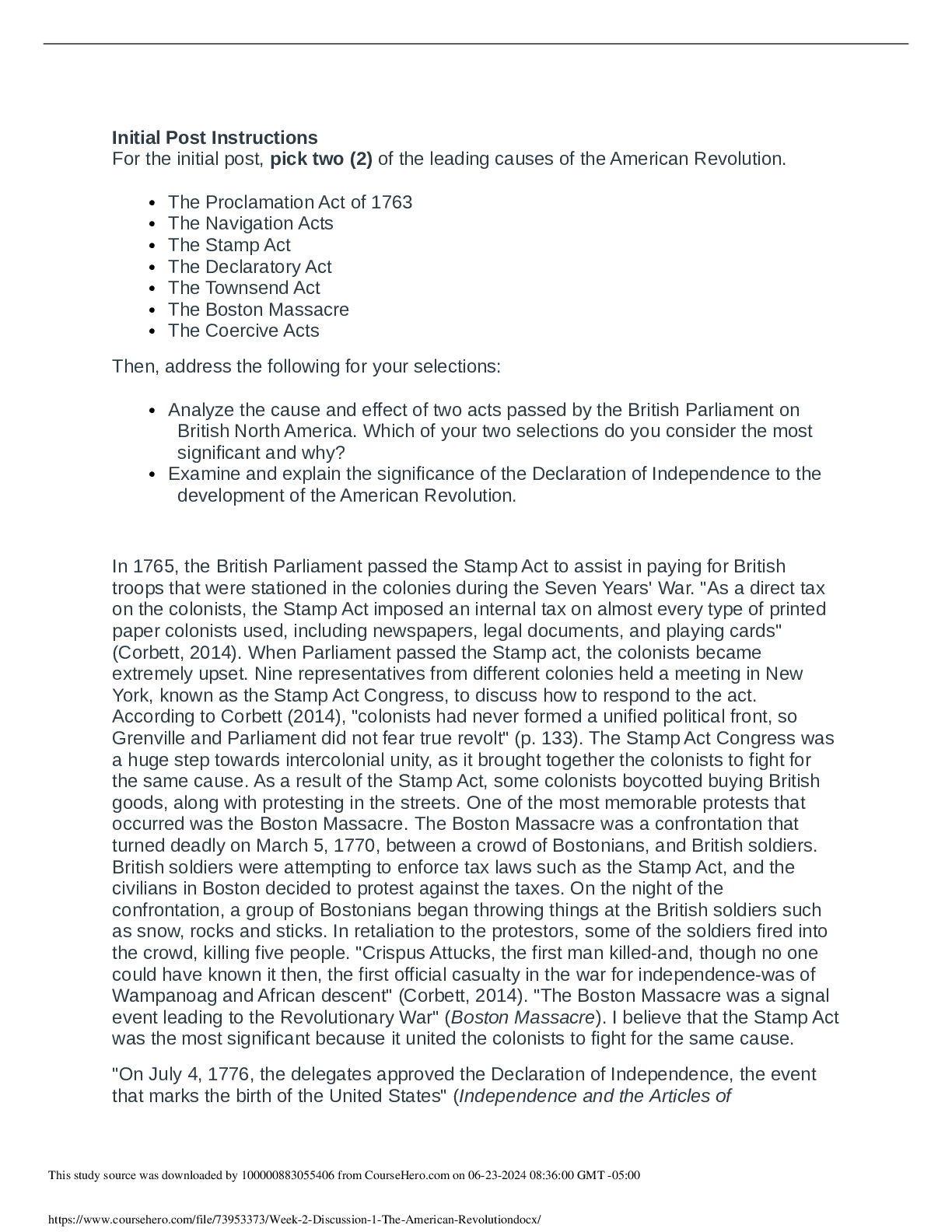
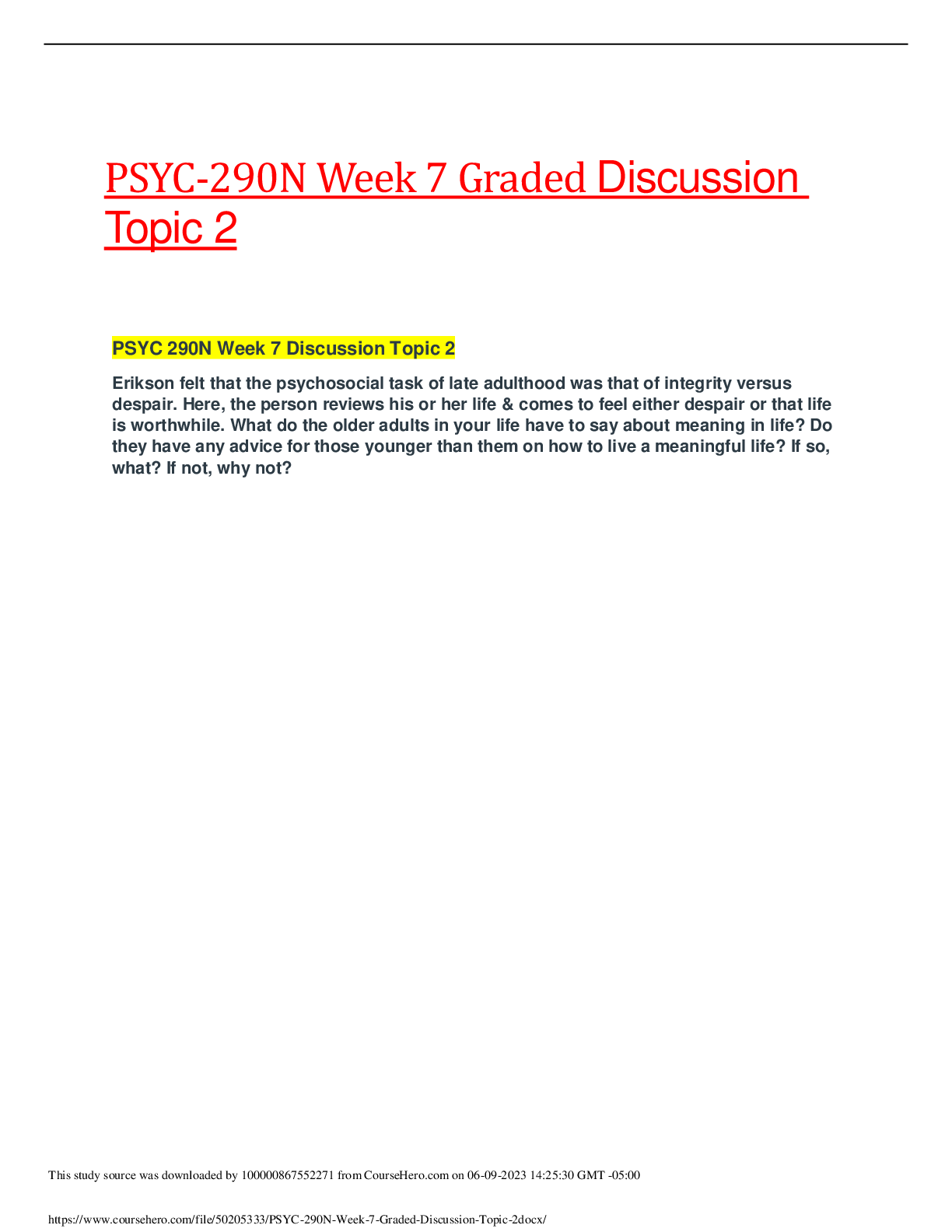


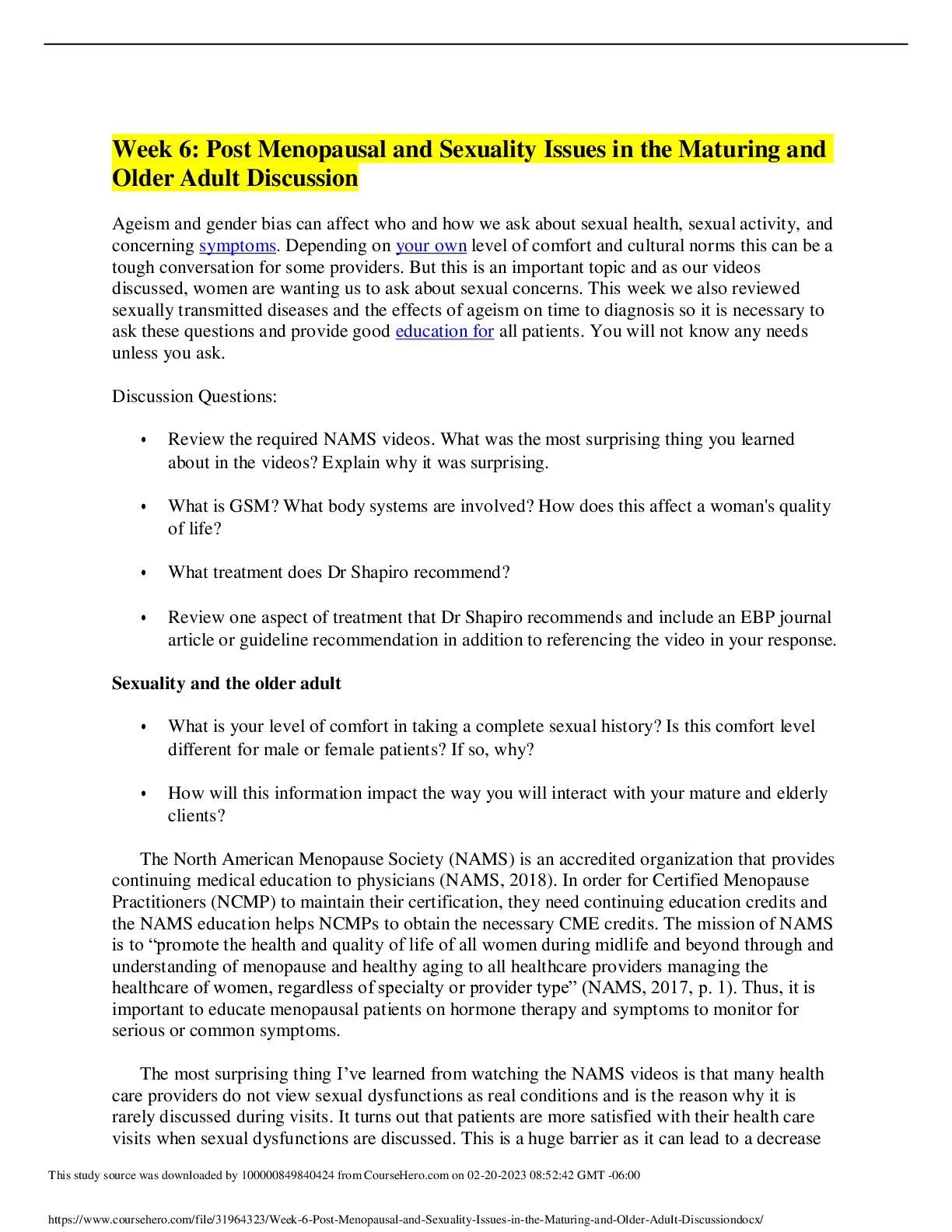

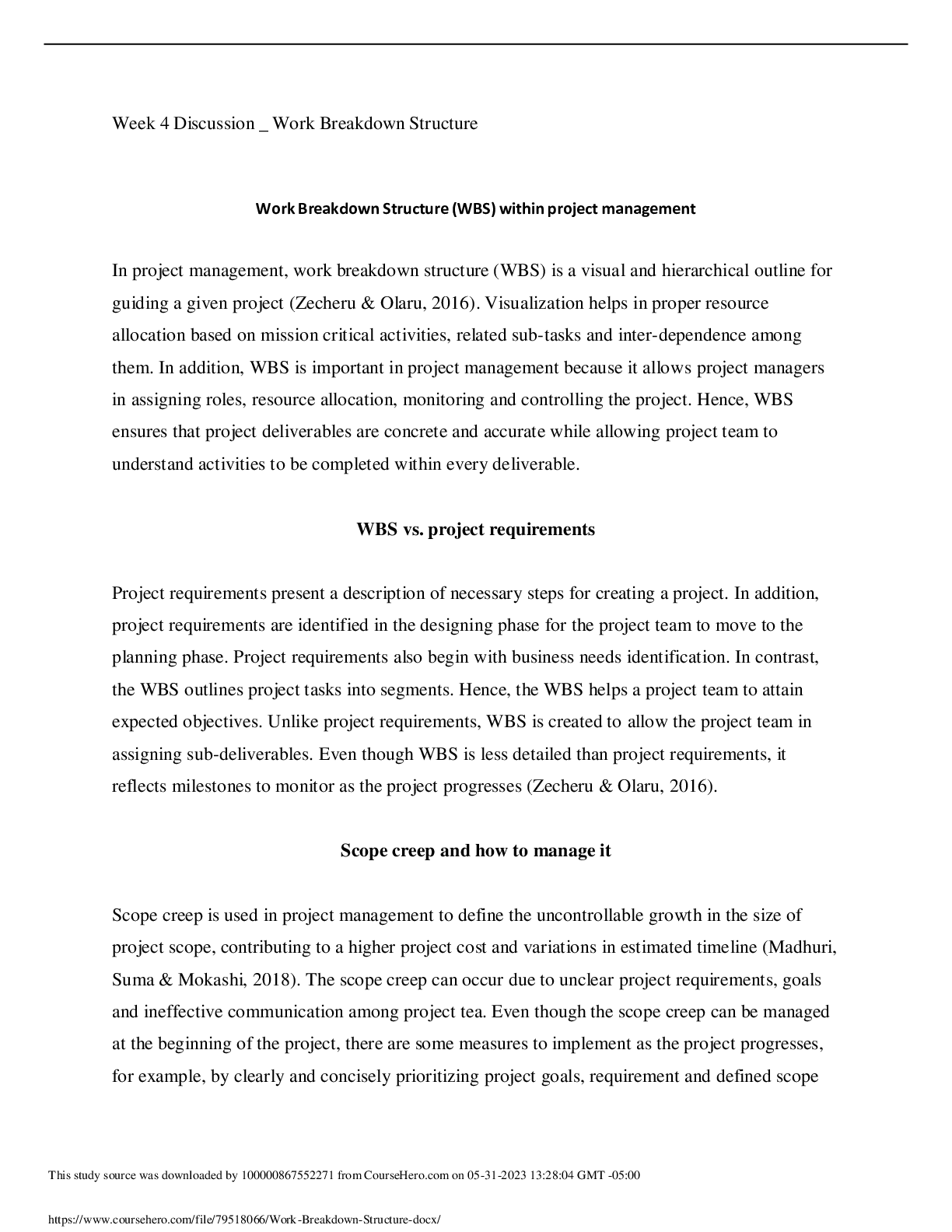
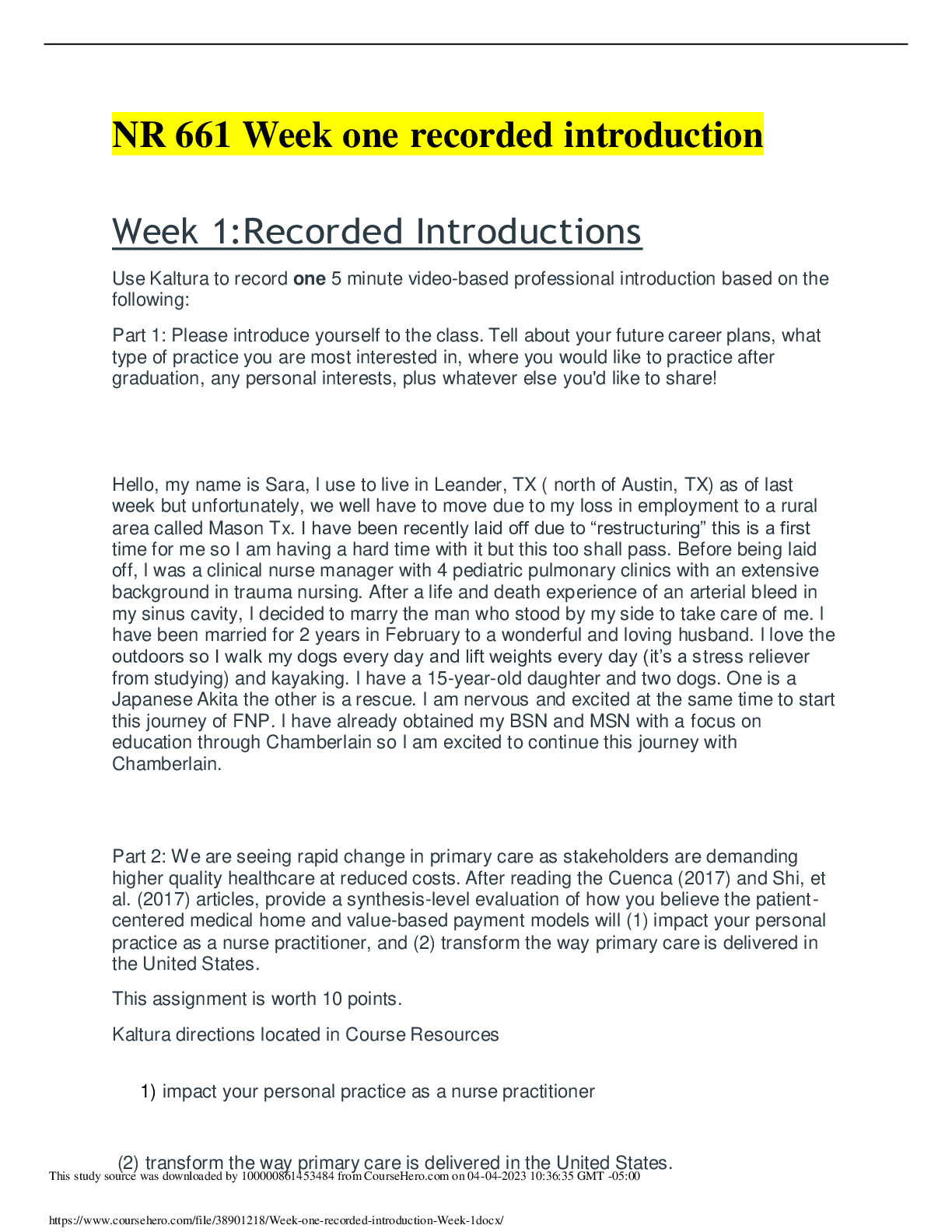
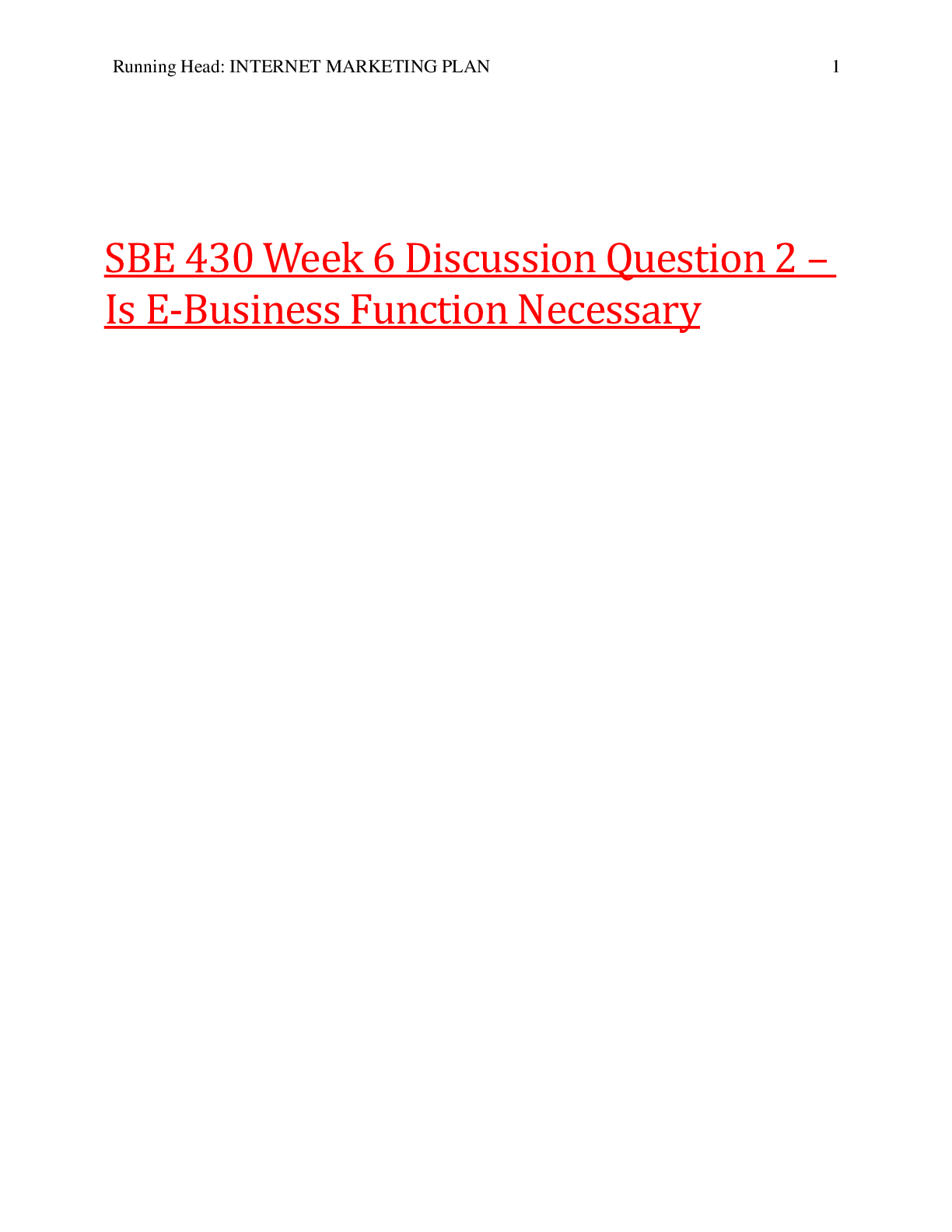
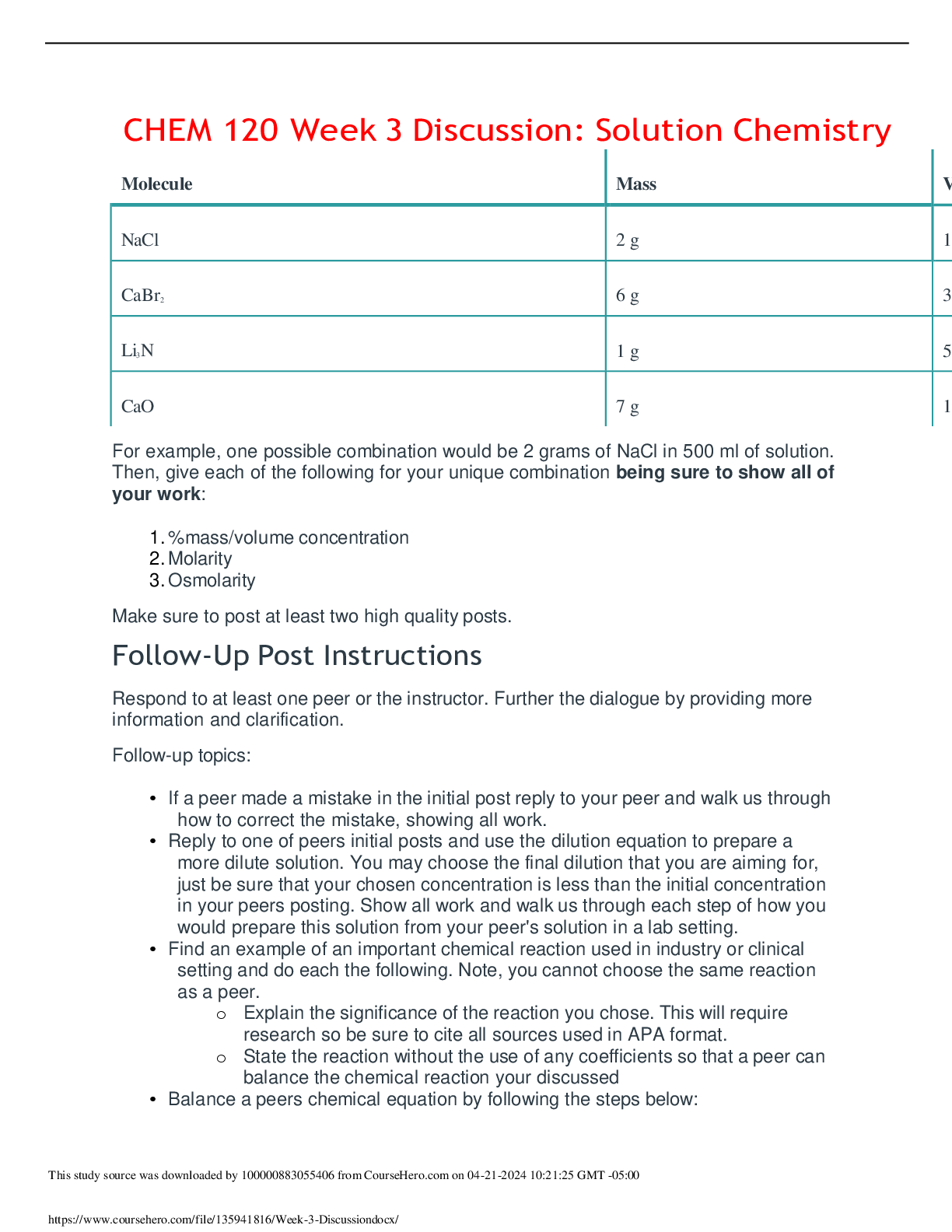
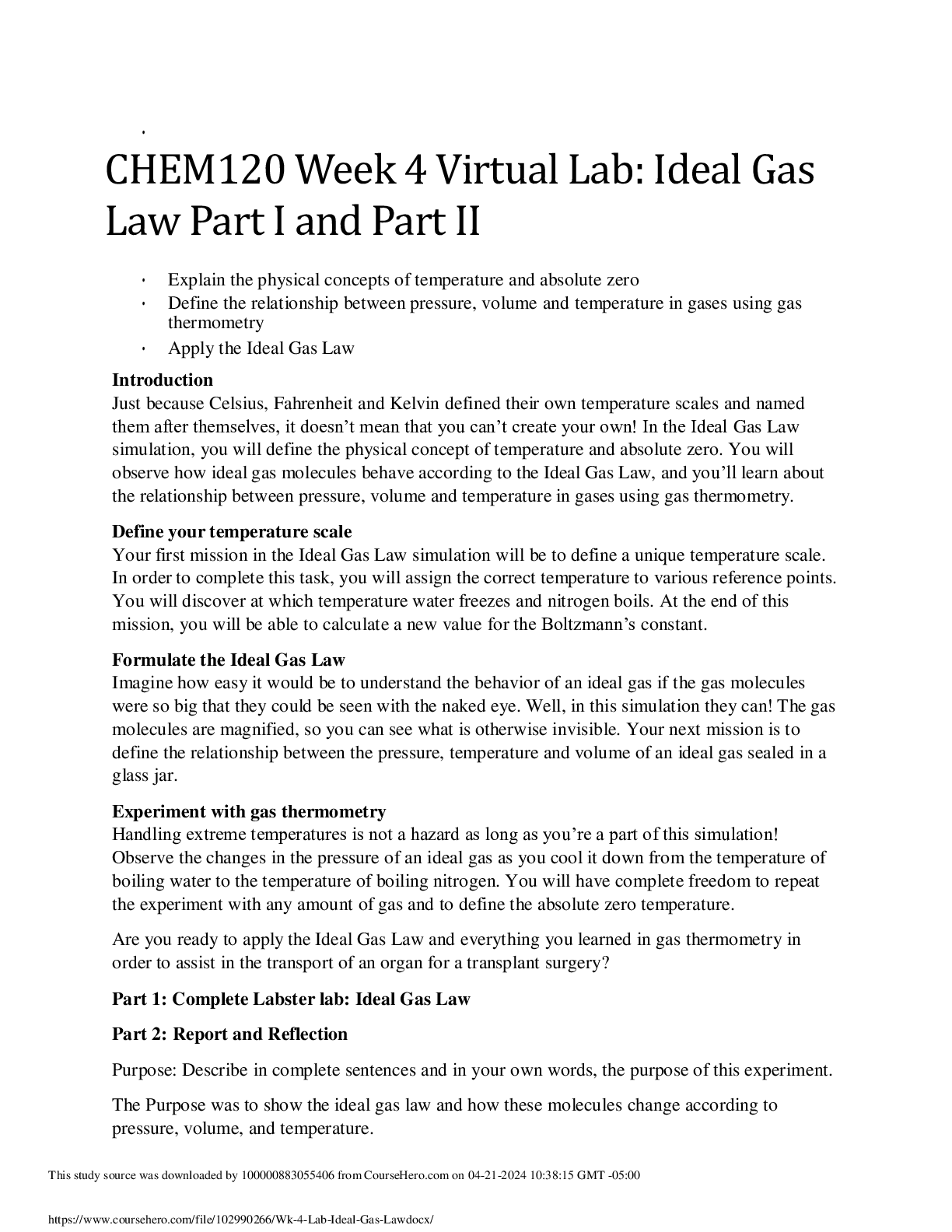
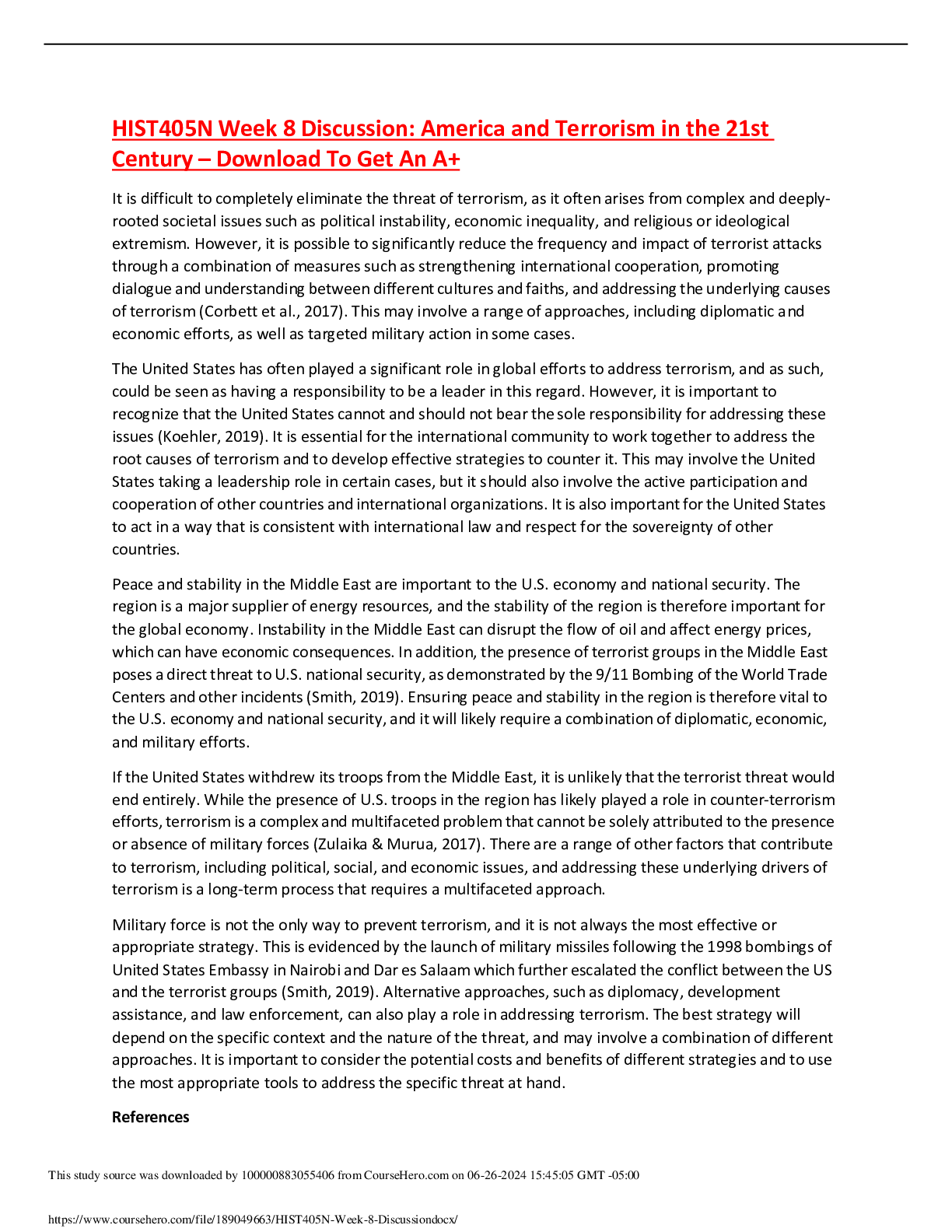



.png)
.png)
.png)
